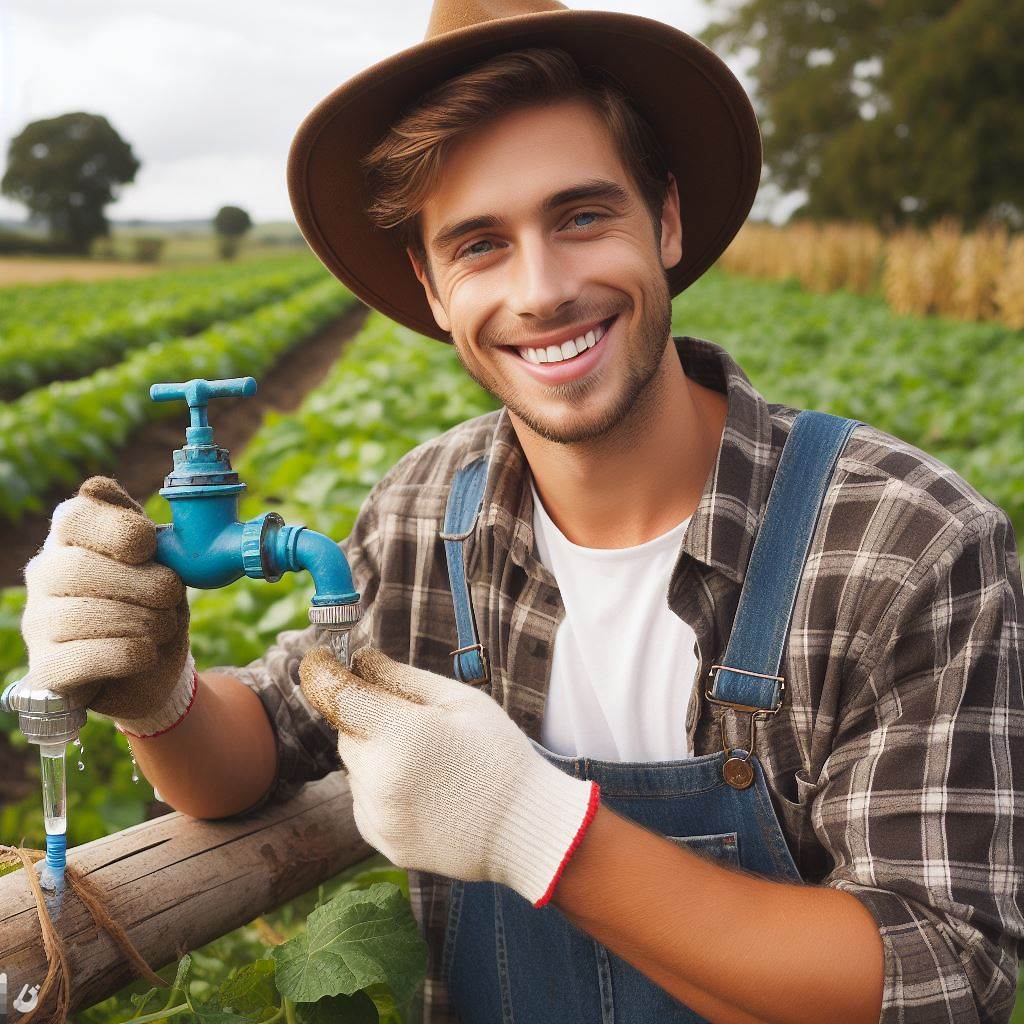Introduction
Water conservation in farms is of utmost importance for several reasons.
Firstly, it ensures the sustainable use of this precious resource.
Secondly, it helps in reducing the environmental impact of farming practices.
However, the current state of water conservation in farms is not ideal.
Farmers need to recognize the significance of water conservation and implement suitable measures accordingly.
This includes adopting efficient irrigation techniques such as drip irrigation and using mulching to reduce evaporation.
Moreover, farmers should regularly monitor their water usage and actively look for ways to minimize wastage.
Implementing water-saving technologies like rainwater harvesting and water recycling systems can also make a substantial difference.
Government initiatives and policies can play a vital role in promoting water conservation in farms.
Encouraging farmers to adopt sustainable practices through incentives, subsidies, and educational programs could greatly contribute to the cause.
Furthermore, raising awareness among consumers about the importance of supporting water-conscious farmers can create a demand for sustainably produced agricultural products.
This, in turn, would motivate farmers to prioritize water conservation practices.
Basically, water conservation in farms is crucial for the sustainability of agriculture and the environment.
While the current state may not be ideal, with concerted efforts from farmers, government, and consumers, significant progress can be made in preserving this valuable resource for future generations.
Factors Affecting Water Conservation in Farms
Water conservation in farms is crucial for sustainable agriculture.
Understanding the factors influencing water usage is vital for effective resource management.
Types of Farming Practices Affecting Water Usage
- Conventional farming methods often involve excessive water usage, leading to depletion and inefficiency.
- Sustainable and regenerative farming practices prioritize water efficiency, promoting conservation and environmental health.
Impact of climate and weather patterns
- Drought conditions pose a significant threat to water availability in farms, impacting crop growth and yield.
- Flooding risks, influenced by unpredictable weather patterns, can lead to water wastage and soil erosion, affecting farm productivity.
Soil health and irrigation methods
Soil health plays a pivotal role in water retention and distribution within the farming ecosystem.
Adopting efficient irrigation methods ensures water reaches crops without unnecessary losses.
Effective water conservation in farms demands a shift from traditional approaches towards sustainable and regenerative practices.
Conventional farming methods, characterized by extensive water use, are increasingly recognized as unsustainable.
To address this, farmers are embracing sustainable and regenerative practices that prioritize water efficiency.
The impact of climate and weather patterns on water conservation cannot be overstated.
Drought conditions, exacerbated by climate change, present a formidable challenge.
Farmers must adapt by implementing water-saving technologies and crop varieties resistant to water scarcity.
Conversely, flooding risks, another consequence of changing weather patterns, pose a threat to water conservation efforts.
Farming practices need to account for these risks, emphasizing resilience and adaptability.
Soil health stands as a cornerstone in the quest for water conservation.
Healthy soils possess better water retention capacities, reducing the need for excessive irrigation.
Adopting soil-friendly practices, such as cover cropping and reduced tillage, contributes to improved water conservation.
Additionally, the choice of irrigation methods significantly influences water usage on farms.
Efficient irrigation systems, such as drip or precision irrigation, minimize water wastage.
These methods ensure that water reaches crops directly, optimizing resource utilization and minimizing environmental impact.
In fact, water conservation in farms is a multifaceted challenge influenced by various factors.
Farmers play a pivotal role in addressing these challenges by transitioning from conventional to sustainable and regenerative practices.
Climate resilience, soil health, and efficient irrigation methods are essential components of a holistic approach to water conservation in agriculture.
Embracing these factors will not only secure water resources for future generations but also contribute to the overall sustainability and productivity of farming systems.
Read: Farmers Markets: Your Local Food Hub
Benefits of Water Conservation in Farms
Environmental benefits
Water conservation in farms brings numerous benefits, not only for the environment but also for the economy and society.
By implementing conservation practices, the agricultural industry can play a crucial role in preserving water resources.
Transform Your Agribusiness
Unlock your farm's potential with expert advice tailored to your needs. Get actionable steps that drive real results.
Get StartedOne of the significant environmental benefits of water conservation in farms is the preservation of water resources.
As the global population continues to grow, ensuring sufficient and clean water for agriculture becomes increasingly important.
By conserving water, farmers help maintain a sustainable water supply for present and future generations.
Moreover, water conservation in farms also contributes to the mitigation of water pollution.
Agricultural runoff, which contains pesticides, fertilizers, and other pollutants, can contaminate water bodies and harm aquatic ecosystems.
Implementing conservation measures such as efficient irrigation systems and proper waste management helps reduce the amount of pollutants reaching water sources, protecting both the environment and public health.
Economic benefits
Conserving water in farms promotes the protection of ecosystem balance.
By preserving water resources and minimizing environmental degradation, farms contribute to the conservation of natural habitats and biodiversity.
This, in turn, ensures the long-term sustainability of ecosystems that are essential for a healthy planet.
In addition to the environmental benefits, water conservation in farms also leads to significant economic advantages.
By reducing water costs, farmers can allocate their financial resources more effectively, thereby increasing their overall profitability.
Implementing efficient irrigation practices, adopting drought-tolerant crops, and collecting rainwater can all contribute to reducing water usage and expenses.
Social benefits
Additionally, water conservation measures support sustainable food production for future generations.
As the demand for food continues to rise, it is crucial to ensure the availability of water resources necessary for agriculture.
By conserving water today, farms can guarantee that future populations will have access to the food they need.
Furthermore, water conservation in farms enhances the public perception of the agricultural industry.
By demonstrating environmental responsibility through conservation practices, farmers can improve their image and reputation.
This can help build trust between farmers and consumers, ensuring the continued support and appreciation for the vital role agriculture plays in society.
In short, water conservation in farms brings various benefits across different aspects.
From the preservation of water resources and protection of the environment to economic profitability and social sustainability, implementing water conservation practices is crucial for the agricultural industry.
By prioritizing water conservation, farms can contribute to a more sustainable future for all.
Read: Cooking Tips: From Farm Produce to Plate
Best Practices for Water Conservation in Farms
Water-saving irrigation techniques
Implementing these best practices for water conservation in farms is crucial for achieving sustainable agricultural practices.
By adopting water-saving irrigation techniques, such as drip irrigation systems, farmers can deliver water precisely where it is needed, minimizing waste through evaporation.
Precision agriculture technologies take it one step further by using sensors and data analysis to ensure optimal irrigation, conserving water resources effectively.
Crop selection and rotation
In addition to efficient irrigation, crop selection and rotation play a significant role in water conservation.
Choosing drought-tolerant crops reduces the overall water requirements, enabling farmers to conserve water without compromising yield.
Furthermore, implementing cover crops helps retain soil moisture, reducing the dependence on excessive irrigation.
These practices not only conserve water but also enhance the overall soil health and fertility.
Implementing proper soil management practices
Proper soil management practices also contribute to water conservation on farms.
Conservation tillage methods, which minimize soil disturbance, help prevent water runoff and improve water infiltration, reducing the need for excessive irrigation.
The addition of compost and organic matter to the soil enhances its water-holding capacity, thus reducing irrigation needs while promoting sustainable soil health.
Monitoring and managing water usage
Monitoring and managing water usage is essential to identify areas for improvement and maximize water conservation efforts.
Regular assessments of water consumption provide valuable insights into usage patterns and help farmers make informed decisions regarding their irrigation practices.
Additionally, utilizing water-efficient tools and equipment, such as precision irrigation controllers or soil moisture sensors, can significantly optimize water usage and minimize waste.
By implementing these best practices for water conservation, farmers can not only reduce their water footprint but also improve the sustainability and resilience of their agricultural operations.
It is crucial to prioritize water conservation in farm practices to ensure the long-term availability of this precious resource and contribute to a more sustainable future in agriculture.
Read: Community Supported Agriculture (CSA) 101

Case Studies of Successful Water Conservation Practices
In this section, we will explore two case studies of farms that have successfully implemented water conservation practices.
By studying these examples, we can gain valuable insights into the benefits and outcomes of such practices.
Bowles Farming Company implementing sustainable techniques
The Bowles Farming Company, located in California, is a prime example of a farm that has embraced sustainable techniques to conserve water.
Through their efforts, they have not only reduced their water consumption but have also achieved significant improvements in crop yield and environmental impact.
The farm, spanning over thousands of acres, implemented various water conservation practices to enhance their efficiency.
One of the key techniques utilized by the company is drip irrigation.
This method delivers water directly to the plant’s roots, minimizing evaporation and runoff.
Additionally, they have installed soil moisture monitoring systems to accurately determine when and how much water is needed, preventing both over- and under-irrigation.
The results of these practices have been remarkable.
The Bowles Farming Company has observed a substantial reduction in water usage, thereby preserving this precious resource.
In addition, the implementation of sustainable techniques has led to increased crop yields due to more efficient water distribution.
Moreover, the reduction in runoff and nutrient leaching has contributed to improved water quality in surrounding areas.
B. J-D Farms adopting precision agriculture methods
J-D Farms, a family-owned farm in Iowa, has achieved significant water conservation through the adoption of precision agriculture methods.
By implementing cutting-edge technologies, the farm has optimized water usage to enhance crop production while minimizing waste.
The farm’s transition to precision agriculture began with the utilization of GPS mapping technology.
This allowed the farmers to precisely identify which areas of the farm required irrigation and determine the appropriate amount for each zone.
Furthermore, J-D Farms utilized variable rate fertilization, tailoring nutrient application to specific areas based on soil test results, reducing the risk of nutrient runoff and water pollution.
Remote sensing technology has also played a crucial role in water conservation at J-D Farms.
Using aerial imagery and advanced sensors, the farm can detect variations in plant health and moisture levels.
This enables targeted irrigation, ensuring that water is delivered only where needed and reducing overall water consumption.
The implementation of precision agriculture methods has yielded positive outcomes for J-D Farms.
By optimizing water usage, the farm has achieved increased efficiency in crop production.
Moreover, the risk of over-irrigation, which can lead to water waste and environmental harm, has been significantly reduced.
These two case studies highlight the success of water conservation practices in farms.
By implementing sustainable techniques like drip irrigation and precision agriculture methods, farmers can not only reduce water usage but also improve crop yield and protect the environment.
Read: Organic vs. Local: A Detailed Comparison
Showcase Your Farming Business
Publish your professional farming services profile on our blog for a one-time fee of $200 and reach a dedicated audience of farmers and agribusiness owners.
Publish Your ProfileChallenges and Future Outlook
Obstacles faced in implementing water conservation practices in farms
- Cost considerations: Farmers often find it challenging to invest in water conservation infrastructure due to high costs.
- Lack of awareness and knowledge: Many farmers lack information about effective water conservation practices and their benefits.
Potential solutions to overcome challenges
- Government support and incentives: Governments can provide financial aid and incentives to encourage farmers to adopt water conservation practices.
- Education and outreach programs: Conducting workshops and training sessions to educate farmers about water-saving techniques can be beneficial.
Future prospects and trends in water conservation for farms
Despite the challenges, the future outlook for water conservation in farms looks promising.
Innovations in technology and farming practices are creating new opportunities for efficient water usage.
One of the emerging trends is the use of precision irrigation systems.
These advanced systems allow farmers to target specific areas and deliver water in a more controlled manner, reducing wastage.
Another trend is the adoption of soil moisture sensors and weather-based irrigation scheduling.
These tools provide real-time data on soil moisture levels and weather conditions, helping farmers optimize irrigation and avoid over-watering.
Furthermore, the integration of smart farming techniques and data analytics in agriculture offers immense potential for water conservation.
By utilizing sensor technologies and analyzing data, farmers can accurately monitor water usage and make informed decisions.
Policy changes and regulations also play a significant role in shaping the future of water conservation in farms.
Governments recognizing the need for sustainable water management are implementing stricter regulations and promoting water-saving practices.
In addition, collaborations between farmers, researchers, and technology providers are essential for driving innovation in water conservation.
Sharing knowledge and experiences can lead to the development of more effective and affordable solutions.
Overall, while challenges exist, the future of water conservation in farms is promising.
With the right support, education, and technological advancements, farmers can overcome obstacles and embrace sustainable practices to ensure the efficient utilization of water resources.
Conclusion
Recap of the importance of water conservation in farms
Water, the essence of life, crucial for farms, demands our utmost attention.
By adopting efficient irrigation methods, farmers safeguard their crops, ensuring a bountiful harvest.
Sustainable water usage mitigates the impact of droughts, bolstering agricultural resilience.
Water conservation isn’t just a practice; it’s a necessity to preserve our agricultural heritage.
Encouragement for farmers to adopt water-saving practices
Dear farmers, the power to change the future lies in your hands.
Embrace water-saving technologies; let innovation be your ally.
Efficient irrigation systems and soil moisture monitoring pave the way for a prosperous, sustainable future.
Your commitment to water conservation not only secures your livelihood but also contributes to a healthier planet.
As stewards of the land, your actions ripple across generations.
Final thoughts on the role of farms in sustainable water management
In general, let us recognize the pivotal role farms play in sustainable water management.
The agricultural sector, with its judicious use of water resources, acts as a linchpin in achieving water sustainability.
Farms are not just producers; they are guardians of our water legacy.
As we embark on this journey towards a water-secure future, let every field cultivated be a testament to our dedication to preserving the lifeblood of our planet.
Water conservation in farms is not merely a choice; it’s an imperative for the well-being of our world.




